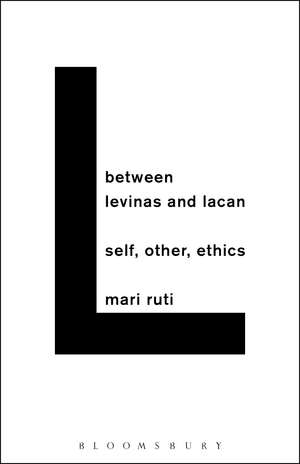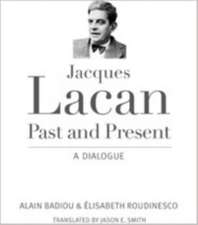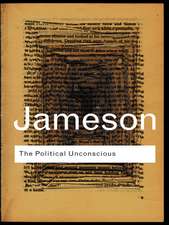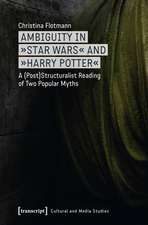Between Levinas and Lacan: Self, Other, Ethics
Autor Professor Mari Rutien Limba Engleză Paperback – 29 iul 2015
| Toate formatele și edițiile | Preț | Express |
|---|---|---|
| Paperback (1) | 191.38 lei 6-8 săpt. | |
| Bloomsbury Publishing – 29 iul 2015 | 191.38 lei 6-8 săpt. | |
| Hardback (1) | 830.46 lei 6-8 săpt. | |
| Bloomsbury Publishing – 29 iul 2015 | 830.46 lei 6-8 săpt. |
Preț: 191.38 lei
Preț vechi: 235.74 lei
-19% Nou
Puncte Express: 287
Preț estimativ în valută:
36.62€ • 38.51$ • 30.26£
36.62€ • 38.51$ • 30.26£
Carte tipărită la comandă
Livrare economică 16-30 aprilie
Preluare comenzi: 021 569.72.76
Specificații
ISBN-13: 9781628926392
ISBN-10: 1628926392
Pagini: 240
Dimensiuni: 140 x 216 x 18 mm
Greutate: 0.34 kg
Editura: Bloomsbury Publishing
Colecția Bloomsbury Academic
Locul publicării:New York, United States
ISBN-10: 1628926392
Pagini: 240
Dimensiuni: 140 x 216 x 18 mm
Greutate: 0.34 kg
Editura: Bloomsbury Publishing
Colecția Bloomsbury Academic
Locul publicării:New York, United States
Caracteristici
Will be of interest to a broad academic readership across critical theory, psychoanalytic theory, continental philosophy, and feminist and queer theory
Notă biografică
Mari Ruti is Professor of Critical Theory at the University of Toronto, Canada. She is the author of, among other books, A World of Fragile Things: Psychoanalysis and the Art of Living (2009), The Singularity of Being: Lacan and the Immortal Within (2012), and The Age of Scientific Sexism: How Evolutionary Psychology Promotes Gender Profiling and Fans the Battle of the Sexes (2015).
Cuprins
Preface 1. Breaking the Obstinacy of Being: Levinas's Ethics of the Face 2. The Ethics of Precarity: Judith Butler's Reluctant Universalism 3. The Lacanian Rebuttal: Zizek, Badiou, and Revolutionary Politics 4. Acts of Defiance: Resistance and Rebellion in Lacan and Marcuse 5. Beyond the Impasses: The Need for Normative Limits Notes BibliographyIndex
Recenzii
Ruti brilliantly elucidates a wholly original and utterly compelling argument for rethinking the post-Enlightenment ethical subject. She does this by demonstrating how some of our most deeply held theoretical paradigms hinge on false oppositions: between the universal and the singular; the subject and the other; agency and subjectivity. Like a magical tour guide, Ruti takes us on a completely fresh journey through previously familiar lands, unsettling received wisdoms so comprehensively and so sensibly that it becomes impossible to recall how one could have ever seen it otherwise.
An extraordinarily balanced book. By showing that Lacan and Levinas are both influenced by the enlightenment conception of subjectivity, Between Levinas and Lacan is one of the first books to bridge the theoretical divide between Lacanians and Levinasians, finding common ground where there is normally animosity and mistrust. It engages and explains these thinkers in a very accessible, and even often charming way, without sacrificing the complexity of anyone's thought. It's an impressive work of scholarship and a worthwhile guide to contemporary ethical debates.
An extraordinarily balanced book. By showing that Lacan and Levinas are both influenced by the enlightenment conception of subjectivity, Between Levinas and Lacan is one of the first books to bridge the theoretical divide between Lacanians and Levinasians, finding common ground where there is normally animosity and mistrust. It engages and explains these thinkers in a very accessible, and even often charming way, without sacrificing the complexity of anyone's thought. It's an impressive work of scholarship and a worthwhile guide to contemporary ethical debates.















